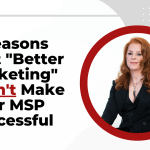We’ve all been there. You’ve engaged a prospect through the entire sales journey, from initial marketing efforts to first contact, to presenting a tailored proposal, only to have them decide against purchasing. It’s a frustrating moment, not just because of the lost sale, but because it often leaves us questioning what went wrong.
Through my years in the industry, I’ve encountered this scenario more times than I care to admit. Each time it’s a learning opportunity, not just about our sales process, but also about the myriad of reasons a qualified prospect might choose to walk away.
Reaching the proposal stage is no small feat. It requires a significant investment of time and resources from both parties. Understanding why a sale doesn’t close is crucial, not just for immediate reflection, but for refining our approach to future prospects.
Six Reasons Qualified Prospects Hesitate To Buy
1. Insufficient Perceived Need And Urgency:
Many times, prospects do not feel the immediate need or urgency to buy. It’s our job to build a compelling case, showing not just the features of our service, but the tangible benefits it brings to their business.
To tackle this, we must focus on building a compelling narrative around the immediate benefits and long-term value of our services. This involves a detailed assessment of their current environment and a clear demonstration of how our solutions address their specific pain points.
2. Unexpected Circumstances:
Life happens. Personal issues or crises can derail a prospect’s intention to buy, often unrelated to our offer. It’s a reminder of the unpredictable human element in sales.
Life’s unpredictability means we must maintain flexibility and empathy in our sales approach. Keeping the lines of communication open and offering support can help navigate these situations, potentially salvaging the sale at a later date.
3. Lack Of Trust Or Compatibility:
A personal disconnect or misaligned expectations can be a deal-breaker. Building trust and ensuring our solutions align with the prospect’s vision is paramount.
Building trust is foundational. This can be achieved by consistently demonstrating expertise, reliability, and understanding. Addressing compatibility concerns means actively listening to their needs and ensuring our solutions align with their business goals.
4. Cost Concerns And Value Perception:
The cost objection is common but surmountable. It’s essential to effectively communicate the value and ROI of our services, ensuring prospects see beyond the price tag to the benefits.
Overcoming price objections requires a strategic explanation of the cost-benefit ratio. We must articulate the value of our services in terms that resonate with the prospect, highlighting the return on investment and long-term savings.
5. Dissatisfaction With Recommendations:
Not every solution will suit every prospect. Flexibility in adapting our recommendations and demonstrating a willingness to tailor our approach can help overcome this hurdle. It’s about finding the right fit for their unique challenges.
6. Reluctance To Change Providers:
Overcoming loyalty to an existing provider demands a clear differentiation. We need to demonstrate unequivocally how our services offer superior value, better outcomes, and a smoother transition, making the case for why change is not just necessary but beneficial.
Overcoming Objections And Closing Sales
Addressing these objections starts with enhancing our sales process. Pre-emptive strategies, better need assessment, and effective communication of value can turn objections into opportunities for engagement and education.
Building Confidence And Competence in Sales
My journey in sales has been a path of continuous learning, underscored by the “four Cs”: Commitment, Courage, Capabilities, and Confidence. Embracing challenges, learning from rejections, and continuously improving our approach is essential for success.
Conclusion
Understanding why qualified prospects don’t buy is a complex puzzle, but it’s one that we must strive to solve. It’s about more than just making a sale; it’s about building relationships, understanding needs, and delivering value. Reflecting on our sales process and embracing the insights from every lost sale can propel us toward greater success.


